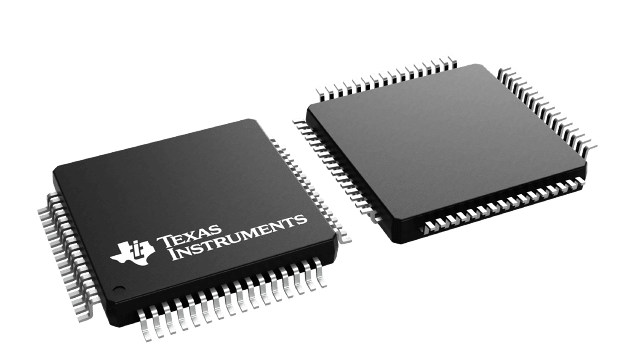Gehäuseinformationen
| Gehäuse | Pins LQFP (PM) | 64 |
| Betriebstemperaturbereich (°C) -40 to 85 |
| Gehäusemenge | Träger 160 | JEDEC TRAY (10+1) |
Merkmale von SN74ABTH18502A
- Members of the Texas Instruments SCOPETM Family of Testability Products
- Members of the Texas Instruments WidebusTM Family
- Compatible With the IEEE Standard 1149.1-1990 (JTAG) Test
Access Port
and Boundary-Scan Architecture - UBTTM (Universal Bus Transceiver) Combines D-Type Latches and D-Type Flip-Flops for Operation in Transparent, Latched, or Clocked Mode
- Bus Hold on Data Inputs Eliminates the Need for External Pullup Resistors
- B-Port Outputs of 'ABTH182502A Devices Have Equivalent 25-
 Series
Resistors, So No External Resistors Are Required
Series
Resistors, So No External Resistors Are Required
- State-of-the-Art EPIC-IIBTM BiCMOS Design
- One Boundary-Scan Cell Per I/O Architecture Improves Scan Efficiency
- SCOPE Instruction Set
- IEEE Standard 1149.1-1990 Required Instructions and Optional CLAMP and HIGHZ
- Parallel-Signature Analysis at Inputs
- Pseudo-Random Pattern Generation From Outputs
- Sample Inputs/Toggle Outputs
- Binary Count From Outputs
- Device Identification
- Even-Parity Opcodes
- Packaged in 64-Pin Plastic Thin Quad Flat (PM) Packages Using
0.5-mm Center-to-Center Spacings and 68-Pin Ceramic Quad Flat (HV)
Packages Using 25-mil Center-to-Center Spacings
SCOPE, Widebus, UBT, and EPIC-IIB are trademarks of Texas Instruments Incorporated.
Beschreibung von SN74ABTH18502A
The 'ABTH18502A and 'ABTH182502A scan test devices with 18-bit universal bus transceivers are members of the Texas Instruments SCOPE testability integrated-circuit family. This family of devices supports IEEE Standard 1149.1-1990 boundary scan to facilitate testing of complex circuit-board assemblies. Scan access to the test circuitry is accomplished via the 4-wire test access port (TAP) interface.
In the normal mode, these devices are 18-bit universal bus transceivers that combine D-type latches and D-type flip-flops to allow data flow in transparent, latched, or clocked modes. They can be used either as two 9-bit transceivers or one 18-bit transceiver. The test circuitry can be activated by the TAP to take snapshot samples of the data appearing at the device pins or to perform a self test on the boundary-test cells. Activating the TAP in the normal mode does not affect the functional operation of the SCOPE universal bus transceivers.
Data flow in each direction is controlled by output-enable (![]() and
and ![]() ), latch-enable (LEAB and LEBA),
and clock (CLKAB and CLKBA) inputs. For A-to-B data flow, the device
operates in the transparent mode when LEAB is high. When LEAB is low,
the A-bus data is latched while CLKAB is held at a static low or high
logic level. Otherwise, if LEAB is low, A-bus data is stored on a
low-to-high transition of CLKAB. When
), latch-enable (LEAB and LEBA),
and clock (CLKAB and CLKBA) inputs. For A-to-B data flow, the device
operates in the transparent mode when LEAB is high. When LEAB is low,
the A-bus data is latched while CLKAB is held at a static low or high
logic level. Otherwise, if LEAB is low, A-bus data is stored on a
low-to-high transition of CLKAB. When ![]() is low, the B outputs are active.
When
is low, the B outputs are active.
When ![]() is high, the B
outputs are in the high-impedance state. B-to-A data flow is similar
to A-to-B data flow but uses the
is high, the B
outputs are in the high-impedance state. B-to-A data flow is similar
to A-to-B data flow but uses the ![]() , LEBA, and CLKBA inputs.
, LEBA, and CLKBA inputs.
In the test mode, the normal operation of the SCOPE universal bus transceivers is inhibited and the test circuitry is enabled to observe and control the I/O boundary of the device. When enabled, the test circuitry performs boundary-scan test operations according to the protocol described in IEEE Standard 1149.1-1990.
Four dedicated test pins observe and control the operation of the test circuitry: test data input (TDI), test data output (TDO), test mode select (TMS), and test clock (TCK). Additionally, the test circuitry performs other testing functions such as parallel-signature analysis (PSA) on data inputs and pseudo-random pattern generation (PRPG) from data outputs. All testing and scan operations are synchronized to the TAP interface.
Improved scan efficiency is accomplished through the adoption of a one boundary-scan cell (BSC) per I/O pin architecture. This architecture is implemented in such a way as to capture the most pertinent test data. A PSA/COUNT instruction also is included to ease the testing of memories and other circuits where a binary count addressing scheme is useful.
Active bus-hold circuitry holds unused or floating data inputs at a valid logic level.
The B-port outputs of 'ABTH182502A, which are designed to source
or sink up to 12 mA, include 25-![]() series resistors to reduce overshoot and undershoot.
series resistors to reduce overshoot and undershoot.
The SN54ABTH18502A and SN54ABTH182502A are characterized for operation over the full military temperature range of -55°C to 125°C. The SN74ABTH18502A and SN74ABTH182502A are characterized for operation from -40°C to 85°C.
A-to-B data flow is shown. B-to-A data flow is similar but uses OEBA\, LEBA, and CLKBA.
Output level before the indicated steady-state input conditions were established
